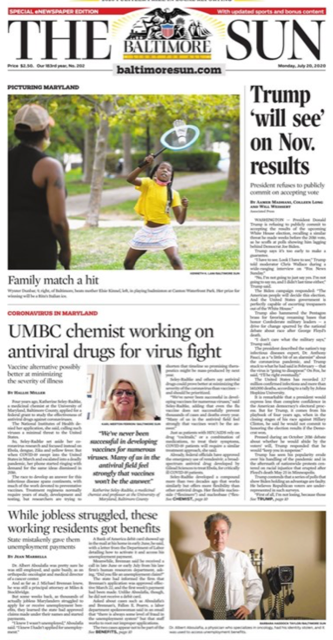
 UMBC Medicinal Chemist Working on Antiviral Drugs, a Possible Alternative to Vaccines, for the Coronavirus –– Dr. Katherine Seley-Radtke, an ACSH advisor, was featured in a front-page article in the Baltimore Sun that describes her efforts to combat the coronavirus. She is an expert in chemistry, biochemistry, and antiviral drug development. The article (right, below photo), which examines a promising COVID drug she discovered, is a follow-up to a recent Op-Ed that the professor co-authored with Dr. Josh Bloom, ACSH's Director of Chemical and Pharmaceutical Science.
UMBC Medicinal Chemist Working on Antiviral Drugs, a Possible Alternative to Vaccines, for the Coronavirus –– Dr. Katherine Seley-Radtke, an ACSH advisor, was featured in a front-page article in the Baltimore Sun that describes her efforts to combat the coronavirus. She is an expert in chemistry, biochemistry, and antiviral drug development. The article (right, below photo), which examines a promising COVID drug she discovered, is a follow-up to a recent Op-Ed that the professor co-authored with Dr. Josh Bloom, ACSH's Director of Chemical and Pharmaceutical Science.
More People Die in Winter Than in Summer. The Coronavirus Could Change That. –– An article written by Dr. Alex Berezow was cited in a piece that recently appeared on the website of Fortune. Data from the Centers for Disease Control show "very clearly that the heart of winter -- December, January, and February -- are the deadliest months of the year," he was quoted. "This may seem counterintuitive, given how much the media hypes summer heat waves. But the reality is that the summer months are actually the safest."
Exclusive: Lonza Expects EPA Approval 'Very Soon' to Make COVID-killing Claims for Surface Disinfectants –– Our Dr. Bloom was interviewed by Thomson Reuters on the subject of cleaning and disinfecting products, and their availability, used to combat the coronavirus. “The Pope couldn’t have bought a bottle of Lysol last week if he wanted to," he was quoted in the global wire service report, "and now because of the EPA’s approval [of Lysol] it’ll be even harder.”
On July 15, Dr. Berezow appeared on the Chicago radio program, The Morning Answer on AM560, discussing COVID-19 and the potential problems that may arise from a vaccine.
Viewpoint: Are Synthetic Food Additives Dangerous? Here’s the Science Anti-Chemical Activists Ignore –– Dr. Bloom's opinion piece on this topic was published on July 17 on the website of the Genetic Literacy Project.
Another Victim of the Coronavirus: Weather Forecast Accuracy –– ACSH was cited in a Washington Examiner article highlighting the recent downturn in commercial flights during the coronavirus catastrophe, a development which degrades meteorologists’ ability to forecast the weather accurately. “Coronavirus has disrupted our lives in multiple, unexpected ways," said Dr. Berezow, "and this might be the most unexpected of all.” The newspaper reports that "data from commercial flights is a significant contributor to forecasting models that meteorologists use to predict the weather."
Lyme Disease Can Be Serious –– In the Cumberland Times-News, which serves readers in parts of Maryland and West Virginia, ACSH was cited as a source pertaining to the timing and appearance of symptoms of the tick-borne disease.
Kirby Wilbur Radio Show –– Dr. Berezow appeared on the Seattle-based talk show Kirby Nation on July 14, addressing the health concerns of parents regarding children returning to school in the fall.
Best Air Purifiers for 2020 –– In a recent article appearing on the tech website CNET about the effectiveness and necessity of using air purifiers, Dr. Berezow was quoted from an article he wrote at the beginning of last summer. (In short, he points out that unless you have a specific health issue, your body is well equipped to filter out impurities. "[Y]ou have an in-built air purifier," he wrote in May 2019, "called the respiratory system.")
The Latest Trends In Immunity-Boosting: What Works And What Doesn’t –– ACSH was referenced in a recent Forbes article, including a quote from us that few ingredients "have surpassed the rigorous standard of 'significant scientific agreement' required by the FDA for authorisation [sic] of a health claim.”
Lastly, on the prominent issue facing parents and educators of whether children can safely return to the classroom for in-person instruction, or participate in group athletic programs, ACSH received some media pick-up from Florida to Chicago, and from at least one rugby blog in between.
In an article titled Gov. DeSantis Argues COVID Picture In Florida Not As Bleak As It Seems, the Sunshine State website Patch cited a recent analysis by Dr. Berezow, writing that it "shows that COVID deaths tend to cluster in older age groups but that the disease had killed people as young as infants."
In Open Up: Could Keeping Schools and Sports Open for Kids be as Easy as Signing a Waiver? published by the Chicago Daily Herald, a journal serving that city's suburban readership, it cited ACSH saying: "The COVID-19 mortality rate, according to the American Council on Science and Health, for people ages 15 through 24 is 0.121 percent. The mortality rate for people ages 5 through 14 is 0.013 percent. Each year, thousands of kids in our school systems get knocked on their backs by the common flu."
And finally, even the Goff Rugby Report got into the act of citing our work. Given its commitment to being "at the forefront of reporting on the American rugby scene," ACSH was prominently mentioned in GRR's mid-July blog post titled Youth & HS Rugby and Return to Play.
GRR writes:
"Here is some information to ponder when you think about rugby coming back in the youth and HS level:
1. Yes, it's true that COVID-19 doesn't not affect young people nearly as badly as it does older people. According to the American Council on Science and Health, almost 81% of the COVID deaths in the USA were to people 65 or older. Deaths for people 24 or younger accounted for 0.15% of all COVID deaths in the country.
Rates of death once you are infected also vary by age. According to the ACSH, the fatality rate for people over 65 is 5.6%, while for people 10-19 years old it's 0.00032%."
###
From wire services with global audiences to the most modest of informational sites serving average Americans, we are pleased to learn that our work is recognized, valued and widely distributed.




